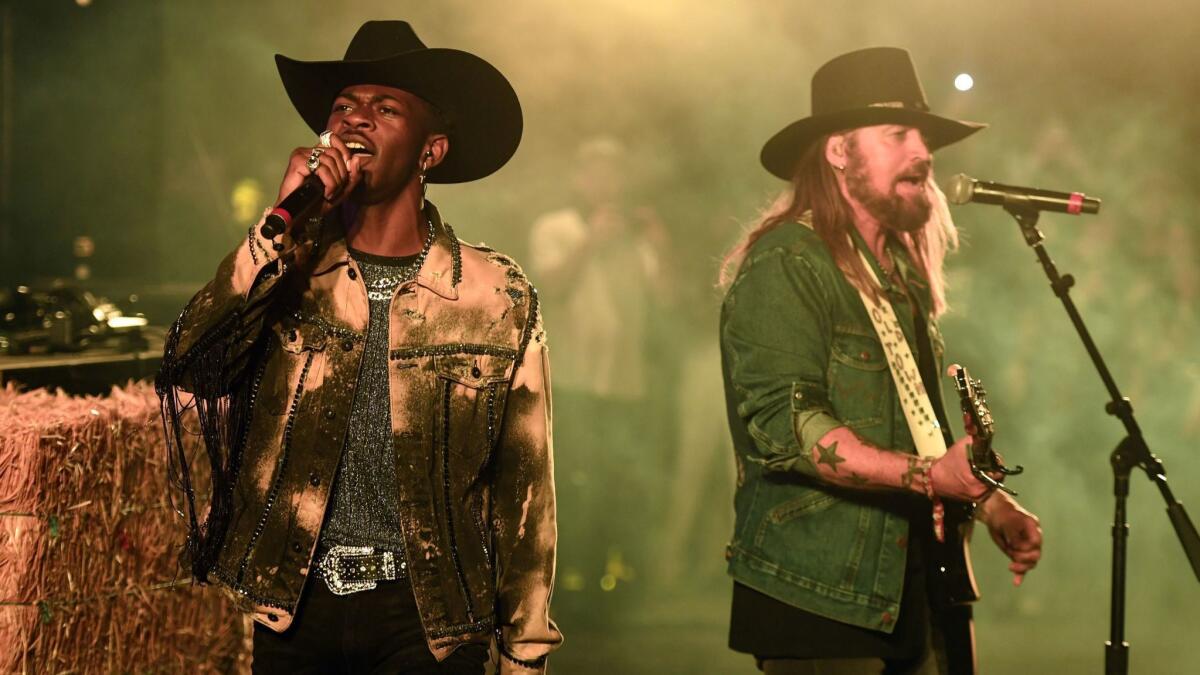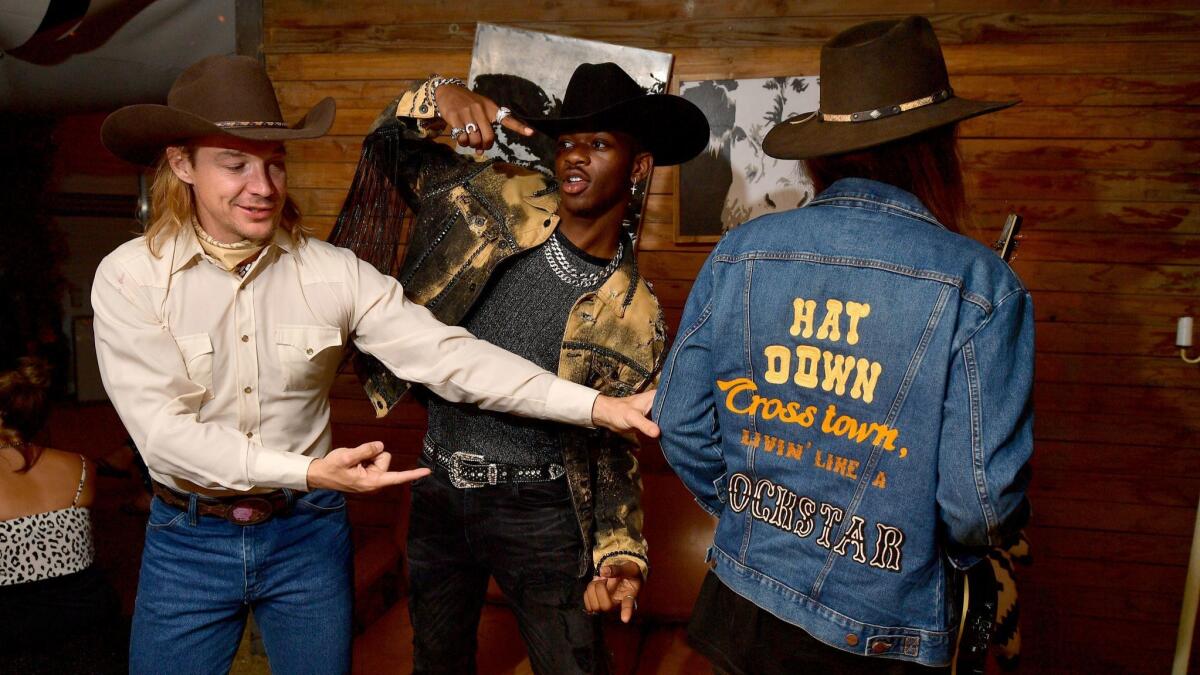Lil Nas X’s ‘Old Town Road’ sounds like country’s future. So why has Nashville snubbed it?

- Share via
Reporting from NASHVILLE — The spirit of Johnny Cash — and of country music itself — is as thick as the pollen at the Cash Cabin in Hendersonville, Tenn. This is the place where the Man in Black recorded much of his later work, and on a recent day it’s the setting for the unveiling of the video for Sheryl Crow’s “Redemption Day,” from her forthcoming duets LP that features posthumous vocals from Cash himself. Crow is here, along with Cash’s son, John Carter Cash, and Mother Maybelle Carter, in stained glass, watches from above as Crow talks about how she fell in love with the genre through the songs of the folks who line these walls. She’s wearing fringe, whiskey’s being poured. This is country.
But Crow’s young kids don’t want to listen to the Carter Family, or Cash. They want Lil Nas X, the just-turned-20 country-rap phenom from Atlanta. “Right now,” she says, “they just want to hear ‘I took my horse to the old town road.’ ”
Crow’s kids, and almost everyone else. Born from something called the “Yee Haw Challenge” on the video-sharing app TikTok, Lil Nas X’s “Old Town Road” has gone from viral meme to No. 1 song in the nation in a matter of weeks.
Combining banjo, backwoods moans, stock images from an old-timey western (horse, cowboy hats, boots), shout-outs to Gucci, Porsche and booty, and an up-to-the-minute hip-hop trap beat, “Old Town Road” has been redacted from the Billboard Hot Country chart (which measures airplay and streaming) for not being country enough, dissed by rapper Dave East for not being rap enough and spoofed by Jimmy Fallon (playing Bernie Sanders). When canny “Achy Breaky Heart” auteur Billy Ray Cyrus jumped on a remix, it tallied a record number of streams to become the biggest single of 2019. It also launched a pickup-truck-load of think-pieces on the nagging subject of race and country music. Finally, America had found a water-cooler topic that didn’t involve the president. Nashville must be reveling in this national notoriety, right?
Not so much. Perhaps the only folks who don’t want to take their horse to the old town road are those in the eye of the storm: the country music industry itself. While musicians such as Keith Urban have had their fun with the song, offering cheeky cover versions on Twitter, in the offices of Nashville’s famed Music Row and on country radio, it’s business as usual.
“To be honest, no one’s talking about it,” says Abe Stoklasa, a Nashville-based songwriter who’s written hits for Tim McGraw and Chris Lane. “I’ve heard it. I liked it. I think it’s cool. But it’s a novelty song. It’s not going to change the way we work.”

At a listening party in town, the topic made people groan. At the Academy of Country Music Awards, publicists avoided it like the plague. Country radio, still the most reliable path to stardom in Nashville, is barely playing it — the song only received 58 spins nationwide for the period of April 24-30, according to Mediabase. Compare that with Top 40 radio, which aired the song 9,281 times over the same seven days. And after being booted from the country ranks initially, the Cyrus remix reentered the Billboard Country Airplay chart at No. 50 — but then promptly fell off. Meanwhile, it’s sitting atop the Billboard Hot 100 for the third week in a row.
“It’s not surprising that ‘Old Town Road’ is where it is on the country chart,” says one radio industry executive who asked to remain anonymous as they are not authorized to speak on the subject. “I believe any airplay from country radio is still out of a somewhat muted effort to appear aware of a pop culture event. So these spins are given begrudgingly.”
It’s not like all the slots those radio programmers offer up go to twangy traditionalists — high-charting (white) country artists like Sam Hunt, Kelsea Ballerini, Thomas Rhett and Florida Georgia Line, among many others, borrow heavily from hip-hop and R&B. In fact, Drake and Bruno Mars are two of the biggest influences on today’s mainstream country stars. In a genre-fluid landscape, it’s an approach that is resonating with fans. But “Old Town Road” receives little airplay. Those who favor more classic sounds will argue that none of it — neither Hunt nor Lil Nas X — should be played on country radio. But by choosing one over the other, Nashville, intentionally or not, has drawn a line in the sand.
“Old Town Road” was working at a disadvantage from the start. There are few things that Music Row — and country radio, in particular — dislikes more than a country phenomenon that originates from outside its own community, especially when there is controversy attached.
Country radio’s myopic nature has been a point of contention in Nashville for decades. Radio ownership groups such as Cumulus Media and Cox Media insist on playing it safe on the airwaves, lest they scare off advertisers or listeners, whom they presume mirror their conservative values. From the banning of Loretta Lynn’s “The Pill” in 1975 to the infamous blacklisting of the Dixie Chicks after their anti-George W. Bush statements, being left of center means being left out of rotation.
Similarly, the Coen Brothers’ 2000 film “O Brother, Where Art Thou?” became a surprise hit due in large part to its Nashville-fed soundtrack, but country radio never made its Grammy-winning single, “Man of Constant Sorrow,” top 10. And although “Old Town Road” couldn’t be more different from “O Brother,” they have one thing in common: neither were Nashville’s idea.
“There have always been moments we have overlooked,” said MoJoe Roberts, content director at 98.7 the Bull in Portland, Ore., one of the few radio stations giving substantial spins to the “Old Town Road” remix. “We need to be a little wiser to how people are consuming music, to open our minds to textural evolution.”
“Don’t worry about trying to classify it,” says country artist Jimmie Allen, one of the genre’s few artists of color on a major label. “We need to expand the musical culture and our mind-set as people. To challenge ourselves to think and process.”
But while the majority of Nashville waits for the “Old Town Road” wave to die down, others, like Jon Loba, president of Cyrus’ and Jason Aldean’s label, BBR Music Group, are seizing the moment. “Old Town Road” has given Cyrus an unexpected publicity boost, but it’s also validated a hunch Loba’s had for a while: that there’s an audience for an explicit mix of country and trap music. It’s why he signed an artist named Blanco Brown, who hails from Atlanta, just like Lil Nas X.
“People thought we were crazy,” says Loba. “So when Nas broke, we thought, ‘We were right!’ There’s this little subculture bubbling up in Atlanta.”
Although it’s yet to be seen if Lil Nas X blows up into a bona fide star or a reality show asterisk, the impact of “Old Town Road” could help diversify a genre in which women and people of color are dramatically underrepresented. According to a new study from Jada Watson at the University of Ottawa, only 11.3% of songs on 2018’s year-end country airplay reports featured female artists.

For Leslie Fram of CMT (Country Music Television), it’s about taking the decision-making back from those radio tastemakers and leaving it in the hands of the fans. “Sales clearly show that they love ‘Old Town Road’ and are engaging with it,” says Fram. “The industry puts music in a box, and clearly that’s not the way fans listen.”
Shannon Houchins, who produced the first record from Bubba Sparxxx and now runs a label with Colt Ford, two artists credited with launching country-rap, also sees country radio’s reluctance to embrace “Old Town Road” as a symptom of a divide between fans and programmers. “Colt Ford keeps selling out concerts and racking up gold singles and Lil Nas X has the biggest song in the world,” Houchins says. “There is clearly a disconnect between what the audience wants and what is being served up.”
Wherever one falls on the scale of “Old Town Road’s” country-o-meter, it has forced one other conversation that Nashville would prefer to avoid: race. The reason the song’s expulsion from the country charts has spurred such outrage is because, fundamentally, it doesn’t differ that much from those by Sam Hunt or Thomas Rhett, save for the skin color of one of the artists. Nashville is overdue to confront its complicated past with how it has capitalized on black traditions but not built up black superstars.
“I imagine that both the success of ‘Old Town Road’ and the controversy it caused are reframing the dialogue,” says Charles Hughes, author of “Country Soul: Making Music and Making Race in the American South.” “This is one of those moments that reminds the country industry that — despite its best efforts to act like race isn’t a problem or has been solved in the Darius Rucker/Kane Brown era — there are still boundaries left to be challenged and hopefully dissolved.”
At the Stagecoach Festival on April 28 in Indio, Calif., country fans clearly saw few boundaries, singing along with every word when Cyrus, top DJ Diplo and Lil Nas X, dripping in gold fringe, took the stage to play the “Old Town Road” remix live for the first time. “It’s a country song,” said Diplo, who also announced his own forthcoming country album, to be released under his given name, Thomas Wesley Pentz.
A trio comprising a country-pop one-hit wonder, an EDM DJ and a rapper might not scream “Nashville.” But it’s more reflective of a country fan’s typical Spotify playlist than any radio programmer would dare admit.
More to Read
The biggest entertainment stories
Get our big stories about Hollywood, film, television, music, arts, culture and more right in your inbox as soon as they publish.
You may occasionally receive promotional content from the Los Angeles Times.










